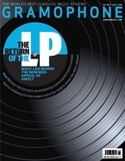Texte paru dans: / Appeared in: |
|
|
Outil de traduction (Très approximatif) |
|
|
Reviewer: Alexandra Coghlan
Part recital, part musical self-help manual, Simone Kermes’s latest album is a guide to love, 17th-century style. Whether your romantic affliction is ‘desire’, ‘bashfulness’, ‘inexperience’ or even (God forbid) ‘fidelity’, you’ll find songs here to medicate you, all helpfully categorised and labelled in the booklet notes. It’s a charming way of reinventing the oldest theme in the classical book, and Kermes’s repertoire choices are wonderfully wide-ranging, taking in the inevitable Dowland, Purcell and Monteverdi, but also works by Cesti, Manelli, Antoine Boësset, Michel Lambert and those unparalleled 17th-century song-writers Tarquinio Merula and Barbara Strozzi.
This idea of the singer/song-writer is at the forefront of an album recorded almost like an acoustic session by a pop singer. Microphones sit close, and Kermes barely engages her support for much of the repertoire, preferring an intimate, white, often breathy delivery – a classical croon. Accompaniments are treated freely, and many works are newly arranged to bring a more folky, unplugged sort of atmosphere to proceedings. It’s an approach that works better for some works than others. Dowland, predictably enough, responds naturally to this treatment. ‘Now, O now I needs must part’ is beautifully judged (though the swooning string portamentos doubling the vocal line won’t be to everyone’s taste). Likewise, Monteverdi’s Lamento della ninfa comes up fresh here, pulsing to the dance rhythms lost in Kožená’s recent recording (DG, 4/16), and the addition of a viola d’amore to the Boësset is an inspired touch. Most successful, though, are the dramatic recitatives and ariosos that demand Kermes finally release something closer to her full voice, showing off the agility and vocal rhetoric that is her greatest strength. John Eccles’s ‘I burn, I burn’ sizzles with emotional charge, while Manelli’s riotous dance ‘Grida l’alma a tutt’ ore’ is infectious in its energy.
But for too much of the album
Kermes just isn’t at her best. The fine-spun lines of Merula’s ‘Folle è ben’ and
Strozzi’s ‘Che si può fare’ are much more interestingly wrought by
L’Arpeggiata’s regular collaborator Raquel Andueza on her ‘D’amore e tormenti’
(NB Records), and tuning more than once turns a little sour. |
|
|
|
|
|
Cliquez l'un ou l'autre
bouton pour découvrir bien d'autres critiques de CD |
|




